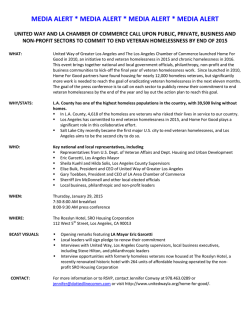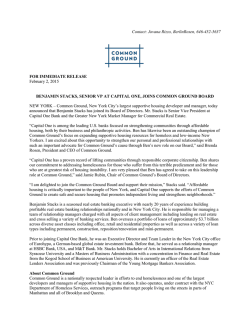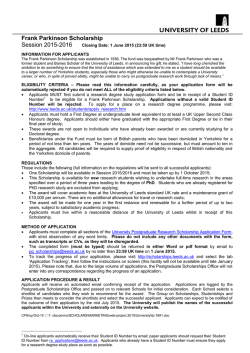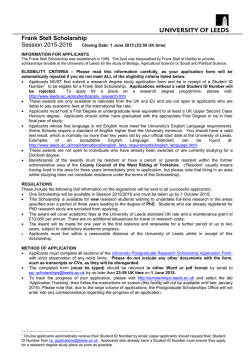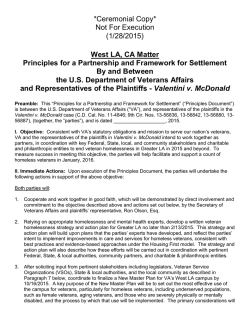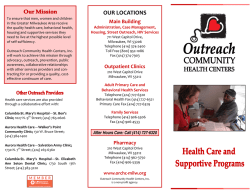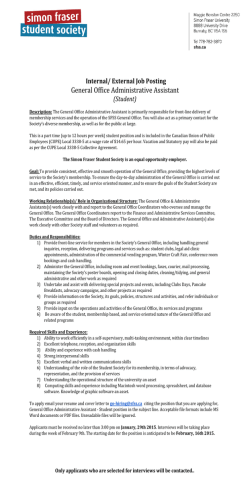
1 DEPARTMENT OF VETERANS AFFAIRS 8320
This document is scheduled to be published in the Federal Register on 02/03/2015 and available online at http://federalregister.gov/a/2015-02070, and on FDsys.gov DEPARTMENT OF VETERANS AFFAIRS 8320-01 Funding Availability Under Supportive Services for Veteran Families Program AGENCY: Veterans Health Administration, Department of Veterans Affairs ACTION: Notice of Fund Availability (NOFA) SUMMARY: VA is announcing the availability of funds for supportive services grants under the SSVF Program. This NOFA contains information concerning the SSVF Program, initial supportive services grant application processes, and the amount of funding available. Funding Opportunity Title: Supportive Services for Veteran Families Program Announcement Type: Initial Funding Opportunity Number: VA-SSVF-021015 Catalog of Federal Domestic Assistance Number: 64.033, VA Supportive Services for Veteran Families Program. The Department of Veterans Affairs (VA) is announcing the availability of funds for supportive services grants under the Supportive Services for Veteran Families (SSVF) Program. This NOFA contains information concerning the SSVF Program, initial supportive services grant application processes, and the amount of funding available. Awards made for supportive services grants will fund operations beginning October 1, 2015. 1 DATES: Applications for supportive services grants under the SSVF Program must be received by the SSVF Program Office by 4:00 p.m. Eastern Time on March 17, 2015. In the interest of fairness to all competing applicants, this deadline is firm as to date and hour, and VA will treat as ineligible for consideration any application that is received after the deadline. Applicants should take this practice into account and make early submission of their materials to avoid any risk of loss of eligibility brought about by unanticipated delays, computer service outages, or other delivery-related problems. ADDRESSES: For a Copy of the Application Package: Copies of the application can be downloaded directly from the SSVF Program Web site at: www.va.gov/homeless/ssvf.asp. Questions should be referred to the SSVF Program Office via phone at (877) 737-0111 (toll-free number) or via email at [email protected]. For detailed SSVF Program information and requirements, see Section 62 of Title 38, Code of Federal Regulations (38 CFR 62). Submission of Application Package: Applicants are strongly encouraged to submit applications electronically following instructions found at www.va.gov/homeless/ssvf.asp. Alternatively applicants can mail in applications. If mailed, applicants must submit two completed, collated, hard copies of the application and two compact discs (CD) containing electronic versions of the entire application are required. Each application copy must (i) be fastened with a binder clip, and (ii) contain tabs listing the major sections of and exhibits to the application. Each CD must be labeled with the applicant’s name and must contain an electronic copy of the entire application. A budget template must be attached in Excel format on the CD, but all other application materials may be attached in a PDF or other format. The application 2 copies and CDs must be submitted to the following address: Supportive Services for Veteran Families Program Office National Center on Homelessness Among Veterans, 4100 Chester Avenue, Suite 201, Philadelphia, PA 19104. Applicants must submit two hard copies and two CDs. Applications may not be sent by facsimile (FAX). Applications must be received in the SSVF Program Office by 4:00 p.m. Eastern Time on the application deadline date. Applications must arrive as a complete package. Materials arriving separately will not be included in the application package for consideration and may result in the application being rejected. See Section II.C. of this NOFA for maximum allowable grant amounts. Technical Assistance: Information regarding how to obtain technical assistance with the preparation of an initial supportive services grant application is available on the SSVF Program Web site at: http://www.va.gov/HOMELESS/SSVF.asp. FOR FURTHER INFORMATION CONTACT: Mr. John Kuhn, Supportive Services for Veteran Families Program Office, National Center on Homelessness Among Veterans, 4100 Chester Avenue, Suite 201, Philadelphia, PA 19104; (877) 737-0111 (this is a tollfree number); [email protected]. SUPPLEMENTARY INFORMATION: I. Funding Opportunity Description A. Purpose: The SSVF Program’s purpose is to provide supportive services grants to private non-profit organizations and consumer cooperatives, who will coordinate or provide supportive services to very low-income Veteran families who: 3 (i) are residing in permanent housing; (ii) are homeless and scheduled to become residents of permanent housing within a specified time period; or (iii) after exiting permanent housing within a specified time period, are seeking other housing that is responsive to such very low-income Veteran family’s needs and preferences. B. Funding Priorities: VA will provide approximately $300 million for existing grantees seeking to renew their grants. C. Definitions: Part 62 of title 38, Code of Federal Regulations (38 CFR 62), contains definitions of terms used in the SSVF Program, eligibility criteria, and programmatic priorities. Respondents to this NOFA should base their proposals and applications on the requirements of part 62 as it exists today. In addition to the definitions and requirements included in those sections, this NOFA includes two program areas: Emergency Housing Assistance and General Housing Stability Assistance. Emergency Housing Assistance means the provision of up to 30 days of temporary housing that does not require the participant to sign a lease or occupancy agreement. The cost cannot exceed the reasonable community standard for such housing. Emergency housing is limited to short-term commercial residences (private residences are not eligible for such funding) not already funded to provide on-demand emergency shelter (such as emergency congregate shelters). By authorizing the limited provision of SSVF-funded emergency housing, grantees will be able to ensure that participants do not become homeless while they transition to permanent housing or otherwise be put at risk, pending placement in permanent housing. Appropriate provision of emergency housing is limited to those cases in which no space is available 4 at a community shelter that would be appropriate for placement of a family unit and where permanent housing has been identified but the participant cannot immediately be placed in that housing. In the event that longer term transitional housing or emergency housing is needed without such restrictions, VA offers community-based alternatives including the Grant and Per Diem Program and the Health Care for Homeless Veterans contract residential care program, as well as a variety of VA-based residential care programs. General Housing Stability Assistance means the provision of goods or payment of expenses not included in other sections, but directly related to supporting a participant’s housing stability. This is a category that may offer a maximum of $1,500 in assistance per participant. Such assistance, when not available through existing mainstream and community resources, may include: (i) items necessary for a participant’s life or safety that are provided to the participant by a grantee on a temporary basis in order to address the participant’s emergency situation; (ii) expenses associated with gaining or keeping employment, such as obtaining uniforms, tools, certifications, and licenses; (iii) expenses associated with moving into permanent housing, such as obtaining basic kitchen utensils, bedding, and other supplies; and (iv) expenses necessary for securing appropriate permanent housing, such as fees for applications, brokerage fees, or background checks. D. Approach: Grantees will be expected to leverage supportive services grant funds to enhance the housing stability of very low-income Veteran families who are occupying permanent housing. In doing so, grantees are required to establish relationships with local community resources. Therefore, agencies must work through 5 coordinated partnerships built either through formal agreements or the informal working relationships commonly found amongst strong social service providers. As part of the application, under 38 CFR 62.22(e), all applicants are strongly encouraged to provide letters of support from their respective VA Network Homeless Coordinator (or their designee). In addition, applicants are strongly encouraged to provide letters of support from the Continuums of Care (CoC) where they plan to deliver services that reflect the applicant’s engagement in the CoC’s efforts to coordinate services. CoCs may elect to provide VA with a rank order of their support in lieu of providing individual letters of support. A CoC is a community plan to organize and deliver housing and services to meet the needs of people who are homeless as they move to stable housing and maximize self-sufficiency. It includes action steps to end homelessness and prevent a return to homelessness (CoC locations and contact information can be found at the Department of Housing and Urban Development’s (HUD) Web site, http://www.hudhre.info/index.cfm?do=viewCocMaps). This coordination should describe the applicant’s participation in the CoC’s coordinated assessment efforts (coordinated assessment refers to a common process for accessing homeless assistance services including: prevention, diversion, emergency shelter, transitional housing, rapid re-housing, supportive services and even permanent supportive housing). In addition, any applicant proposing to serve an Indian Tribal area is strongly encouraged to provide a letter of support from the relevant Indian Tribal Government. The aim of the provision of supportive services is to assist very low-income Veteran families residing in permanent housing to remain stably housed and to rapidly transition those not currently in permanent housing to stable housing. SSVF emphasizes the 6 placement of homeless Veteran families who are described in regulation as (i) very lowincome Veteran families who are homeless and scheduled to become residents of permanent housing within 90 days, and (ii) very low-income Veteran families who have exited permanent housing within the previous 90 days to seek other housing that is responsive to their needs and preferences. Accordingly, VA encourages eligible entities skilled in facilitating housing stability and experienced in operating rapid re-housing programs (i.e., administering HUD’s Homelessness Prevention and Rapid Re-Housing Program, HUD’s Emergency Solution Grant (ESG), or other comparable Federal or community resources) to apply for supportive services grants. As a crisis intervention program, the SSVF Program is not intended to provide long-term support for participants, nor will it be able to address all of the financial and supportive services needs of participants that affect housing stability. Rather, when participants require long-term support, grantees should focus on connecting such participants to income supports, such as employment and mainstream Federal and community resources (e.g., HUD-VA Supportive Housing program, HUD Housing Choice Voucher programs, McKinney-Vento funded supportive housing programs, Temporary Assistance for Needy Families (TANF), and Social Security Income/Social Security Disability Insurance (SSI/SSDI) etc.) that can provide ongoing support as required. Assistance in obtaining or retaining permanent housing is a fundamental goal of the SSVF Program. Grantees must provide case management services in accordance with 38 CFR 62.31. Such case management should include tenant counseling, mediation with landlords and outreach to landlords. 7 E. Authority: Funding applied for under this NOFA is authorized by 38 U.S. Code (U.S.C.) 2044. VA implements the SSVF Program by regulation in 38 CFR part 62. Funds made available under this NOFA are subject to the requirements of the aforementioned regulations and other applicable laws and regulations. F. Requirements for the Use of Supportive Services Grant Funds: The grantee’s request for funding must be consistent with the limitations and uses of supportive services grant funds set forth in 38 CFR part 62 and this NOFA. In accordance with the regulations and this NOFA, the following requirements apply to supportive services grants awarded under this NOFA: 1. Grantees may use a maximum of 10 percent of supportive services grant funds for administrative costs identified in 38 CFR 62.70. 2. Grantees must use a minimum of 60 percent of the temporary financial assistance portion of their supportive services grant funds to serve very low-income Veteran families who qualify under 38 CFR 62.11. (NOTE: Grantees may request a waiver to decrease this minimum, as discussed in section V.B.3.a.) 3. Grantees may use a maximum of 50 percent of supportive services grant funds to provide the supportive service of temporary financial assistance paid directly to a third party on behalf of a participant for child care, emergency housing assistance, transportation, rental assistance, utility-fee payment assistance, security deposits, utility deposits, moving costs, and general housing stability assistance (which includes emergency supplies) in accordance with 38 CFR 62.33 and 38 CFR 62.34. G. Guidance for the Use of Supportive Services Grant Funds: It is VA policy to support a “Housing First” model in addressing and ending homelessness. Housing First 8 establishes housing stability as the primary intervention in working with homeless persons. The Housing First approach is based on research that shows that a homeless individual or household's first and primary need is to obtain stable housing, and that other issues that may affect the household can and should be addressed as housing is obtained. Research supports this approach as an effective means to end homelessness. Housing is not contingent on compliance with mandated therapies or services; instead, participants must comply with a standard lease agreement and are provided with the services and supports that are necessary to help them do so successfully. Grantees must develop plans that will ensure that Veteran participants have the level of income and economic stability needed to remain in permanent housing after the conclusion of the SSVF intervention. Both employment and benefits assistance from VA and non-VA sources represent a significant underutilized source of income stability for homeless Veterans. The complexity of program rules and the stigma some associate with entitlement programs contributes to their lack of use. To this effect, grantees are encouraged to consider strategies that can lead to prompt and successful access to employment and benefits that are essential to retaining housing. 1. Consistent with the Housing First model supported by VA, grantees are expected to offer the following supportive services: housing counseling; assisting participants in understanding leases; securing utilities; making moving arrangements; providing representative payee services concerning rent and utilities when needed; and mediation and outreach to property owners related to locating or retaining housing. Grantees may also assist participants by providing rental assistance, security or utility 9 deposits, moving costs or emergency supplies; or using other Federal resources, such as the HUD’s ESG, or supportive services grant funds subject to the limitations described in this NOFA and 38 CFR 62.34. 2. As SSVF is a short-term crisis intervention, grantees must develop plans that will produce sufficient income to sustain Veteran participants in permanent housing after the conclusion of the SSVF intervention. Grantees must ensure the availability of employment and vocational services either through the direct provision of these services or their availability through formal or informal service agreements. Agreements with Homeless Veteran Reintegration Programs funded by the U.S. Department of Labor are strongly encouraged. For participants unable to work due to disability, income must be established through available benefits programs. 3. Per 38 CFR 62.33, grantees must assist participants in obtaining public benefits. Grantees must screen all participants for eligibility for a broad range of entitlements such as TANF, Social Security, the Supplemental Nutrition Assistance Program (SNAP), the Low Income Home Energy Assistance Program (LIHEAP), the Earned Income Tax Credit (EITC), and local General Assistance programs. Grantees are expected to access the Substance Abuse and Mental Health Services Administration's SSI/SSDI Outreach, Access, and Recovery (SOAR) program either though community linkages or by training staff to deliver SOAR services. In addition, where available grantees should access information technology tools to support case managers in their efforts to link participants to benefits. 4. Grantees are encouraged to provide, or assist participants in obtaining, legal services relevant to issues that interfere with the participants’ ability to obtain or retain 10 permanent housing. (NOTE: Information regarding legal services provided may be protected from being released to the grantee or VA under attorney-client privilege.) Support for legal services can include paying for court filing fees to assist a participant with issues that interfere with the participant’s ability to obtain or retain permanent housing or supportive services, including issues that affect the participant’s employability and financial security. Grantees (in addition to employees and members of grantees) may represent participants before VA with respect to a claim for VA benefits, but only if they are recognized for that purpose pursuant to 38 U.S.C. Chapter 59. Further, the individual providing such representation must be accredited pursuant to 38 U.S.C. Chapter 59. 5. Access to mental health and addiction services are required by SSVF; however, grantees cannot fund these services directly through the SSVF grant. Therefore, applicants must demonstrate, through either formal or informal agreements, their ability to promote rapid access and engagement to mental health and addiction services for the Veteran and family members. 6. VA recognizes that extremely low-income Veterans, with incomes below 30 percent of the area median income, face greater barriers to permanent housing placement. Grantees should consider how they can support these participants. 7. Notwithstanding any other section in this part, grantees are not authorized to use SSVF funds to pay for the following: (i) mortgage costs or costs needed by homeowners to assist with any fees, taxes, or other costs of refinancing; (ii) construction or the cost of housing rehabilitation; (iii) credit card bills or other consumer debt; 11 (iv) medical or dental care and medicines; (v) mental health, substance use, or other therapeutic interventions designed to treat diagnostic conditions as defined in the Diagnostic and Statistical Manual of Mental Disorders (NOTE: Although SSVF grant funds cannot be used to pay for the treatment of mental health or substance use disorders, grantees are required to offer such services through formal coordinated relationships with VA and other community providers); (vi) home care and home health aides typically used to provide care in support of daily living activities (this includes care that is focused on treatment for an injury or illness, rehabilitation, or other assistance generally required to assist those with handicaps or other physical limitations); (vii) pet care; (viii) entertainment activities; (ix) direct cash assistance to program participants; or (x) court-ordered judgments or fines. 8. When serving participants who are residing in permanent housing, it is required that the defining question to ask is: “Would this individual or family be homeless but for this assistance?” The grantee must use a VA approved screening tool with criteria that targets those most at-risk of homelessness. To qualify for SSVF services, a participant who is served under Category 1 (homeless prevention) must not have sufficient resources or support networks (e.g., family, friends, faith-based or other social networks) immediately available to prevent them from becoming homeless. To further qualify for services under Category 1, the grantee must document that the participant meets at least one of the following conditions: (a) Has moved because of economic reasons two or more times during the 60 days immediately preceding the application for homelessness prevention assistance; (b) Is living in the home of another because of economic hardship; 12 (c) Has been notified in writing that their right to occupy their current housing or living situation will be terminated within 21 days after the date of application for assistance; (d) Lives in a hotel or motel and the cost of the hotel or motel stay is not paid by charitable organizations or by Federal, State, or local government programs for lowincome individuals; (e) Is exiting a publicly funded institution or system of care (such as a health care facility, a mental health facility, or correctional institution) without a stable housing plan; or (f) Otherwise lives in housing that has characteristics associated with instability and an increased risk of homelessness, as identified in the recipient’s approved screening tool. 9. The TANF program may also be used to address the housing-related needs of families who are homeless or precariously housed and, along with providing ongoing basic assistance, provide an array of non-recurrent, short-term benefits and services. Such benefits and services may include short-term rental or mortgage assistance (to prevent eviction or help a homeless family secure housing), security and utility payments, moving assistance, motel and hotel vouchers, and case management services. For additional information on TANF and homelessness, please visit the following link to an Information Memorandum issued by the United States Department of Health and Human Services Administration for Children and Families, Office of Family Assistance, on February 20, 2013, titled, “Use of TANF Funds to Serve Homeless 13 Families and Families at Risk of Experiencing Homelessness”: http://www.acf.hhs.gov/programs/ofa/resource/tanf-acf-im-2013-01. 10. Where other funds from community resources are not readily available, grantees may choose to utilize supportive services grants, to the extent described in this NOFA and in 38 CFR 62.33 and 62.34, to provide temporary financial assistance. Such assistance may, subject to the limitations in this NOFA and 38 CFR part 62, be paid directly to a third party on behalf of a participant for child care, transportation, family emergency housing assistance, rental assistance, utility-fee payment assistance, security or utility deposits, moving costs and general housing stability assistance as necessary. II. Award Information A. Overview: This NOFA announces the availability of funds for supportive services grants under the SSVF Program and pertains to proposals for renewal of existing supportive services grant programs. New applications for SSVF grant awards will not be funded through this NOFA. Up to $300 million will be available through this NOFA. B. Funding: To be eligible for renewal of a supportive services grant, the grantee’s program concept must be substantially the same with the program concept of the grantee’s current grant award. Renewal applications can request funding that is equal to or less than their current award. If sufficient funding is available, VA may provide an increase of up to 2 percent from the previous year’s award. Any percentage increase, if provided, will be awarded uniformly to all grant recipients regardless of their grant award. 14 C. Allocation of Funds: Funding will be awarded under this NOFA to existing grantees for a 1 to 3-year period beginning October 1, 2015. The following requirements apply to supportive services grants awarded under this NOFA: 1. In response to this NOFA, applicants can only submit renewal applications for existing awards. 2. Each grant request cannot exceed the current award, unless proposing to expand services into an adjacent county(ies) or CoC currently unserved by any SSVF grantee. All requests to expand services must propose services in conformance with the existing grant. Additional funds can be requested to support such expansion, but requests are limited to 20 percent of the existing award. 3. Those applicants seeking to expand service areas, as described in II.C.2, must include a narrative description of this expansion. This narrative description is not to exceed one page. The narrative must include the name of the county(ies) and CoC to be served, demonstrate the need for such expansion, and the projected cost per household. Requests to expand services into areas adjacent to existing grant service areas will be considered independently to the existing grant renewal request, so that the renewal may be funded without the inclusion of the proposed expansion. 4. Applicants may request an amount less than their current award (this will not be considered a substantial change to the program concept). 15 5. If grantee failed to use all of awarded funds in the previous fiscal year (2014), VA may elect to limit renewal award to the amount of funds used in the previous fiscal year. 6. Applicants should fill out separate applications for each supportive services renewal funding request. D. Supportive Services Grant Award Period: Grant awards are generally made for a 1-year period, although selected grants may be eligible for a 3-year award (see VI.C.6). All grants are eligible to be renewed subject to available appropriations. III. Eligibility Information A. Eligible Applicants: In order to be eligible, an applicant must qualify as a private non-profit organization (section 501(c)(3) or 501(c)(19) tax exempt status is required) or a consumer cooperative as defined in 38 U.S.C. 2044(f). In addition, tribally designated housing entities (as defined in section 4 of the Native American Housing Assistance and Self-Determination Act of 1996 (25 U.S.C. 4103)) are eligible. B. Cost Sharing or Matching: None. IV. Application and Submission Information A. Address to Request Application Package: Download directly from the SSVF Program Web site at www.va.gov/homeless/ssvf.asp or send a written request for an application to SSVF Program Office, National Center on Homelessness Among Veterans, 4100 Chester Avenue, Suite 201, Philadelphia, PA 19104. Any questions regarding this process should be referred to the SSVF Program Office via phone at (877) 737-0111 (toll-free number) or via email at [email protected]. For detailed SSVF Program information and requirements, see 38 CFR 62. 16 B. Content and Form of Application: Applicants are strongly encouraged to submit applications electronically following instructions found at www.va.gov/homeless/ssvf.asp. Alternatively applicants can mail in applications. If mailed, applicants must submit two completed collated, hard copies of the application and two compact discs (CD) containing electronic versions of the entire application are required. Each application copy must (i) be fastened with a binder clip, and (ii) contain tabs listing the major sections of and exhibits to the application. Each CD must be labeled with the applicant’s name and must contain an electronic copy of the entire application. A budget template must be attached in Excel format on the CD, but all other application materials may be attached in a PDF or other format. C. Submission Dates and Times: Applications for supportive services grants under the SSVF Program must be received by the SSVF Program Office by 4:00 p.m. Eastern Time on March 17, 2015. Awards made for supportive services grants will fund operations beginning October 1, 2015. Applications must arrive as a complete package. Materials arriving separately will not be included in the application package for consideration and may result in the application being rejected. Additionally, in the interest of fairness to all competing applicants, this deadline is firm as to date and hour, and VA will treat as ineligible for consideration any application that is received after the deadline. Applicants should take this practice into account and make early submission of their materials to avoid any risk of loss of eligibility brought about by unanticipated delays, computer service outages, or other delivery-related problems. D. Intergovernmental Review: This section is not applicable to the SSVF Program. 17 E. Funding Restrictions: Approximately $300 million may be awarded depending on funding availability and subject to available appropriations for initial supportive services grants to be funded under this NOFA. Applicants should fill out separate applications for each supportive services funding request. Funding will be awarded under this NOFA to existing grantees for a 1 to 3-year period beginning October 1, 2015. F. Other Submission Requirements: 1. Applicants may apply only as renewal applicants using the application designed for renewal grants. 2. If applicants are proposing to expand services into counties or CoCs adjacent to their current services area, they must submit a separate budget for the expanded service area in addition to the budget for the renewal of the existing grant service area. 3. At the discretion of VA, multiple grant proposals submitted by the same lead agency may be combined into a single grant award if the proposals provide services to contiguous areas. 4. Additional supportive services grant application requirements are specified in the initial application package. Submission of an incorrect or incomplete application package will result in the application being rejected during threshold review. The application packages must contain all required forms and certifications. Selections will be made based on criteria described in 38 CFR part 62 and this NOFA. Applicants and grantees will be notified of any additional information needed to confirm or clarify information provided in the application and the deadline by which to submit such information. Applicants are strongly encouraged to submit applications electronically. If 18 mailed, applications and CDs must be submitted to the following address: SSVF Program Office, National Center on Homelessness Among Veterans, 4100 Chester Avenue, Suite 201, Philadelphia, PA 19104. Applicants must submit two hard copies and two CDs. Applications may not be sent by facsimile (FAX). V. Application Review Information A. Criteria: 1. VA will only score applicants that meet the following threshold requirements: (a) The application is filed within the time period established in the NOFA, and any additional information or documentation requested by VA under 38 CFR 62.20(c) is provided within the time frame established by VA; (b) The application is completed in all parts; (c) The applicant is an eligible entity; (d) The activities for which the supportive services grant is requested are eligible for funding under this part; (e) The applicant's proposed participants are eligible to receive supportive services under this part; (f) The applicant agrees to comply with the requirements of this part; (g) The applicant does not have an outstanding obligation to the Federal Government that is in arrears and does not have an overdue or unsatisfactory response to an audit; and (h) The applicant is not in default by failing to meet the requirements for any previous Federal assistance. 19 2. VA will use the following criteria to score grantees applying for renewal of a supportive services grant: (a) VA will award up to 55 points based on the success of the grantee's program. (b) VA will award up to 30 points based on the cost-effectiveness of the grantee's program. (c) VA will award up to 15 points based on the extent to which the grantee's program complies with Supportive Services for Veteran Families Program goals and requirements. 3. VA will use the following process to select applicants to receive supportive services grants: VA will score all applicants that meet the threshold requirements set forth in 38 CFR 62.21 using the scoring criteria set forth in 38 CFR 62.22. B. Review and Selection Process: VA will review all supportive services grant applications in response to this NOFA according to the following steps: 1. Score all applications that meet the threshold requirements described in 38 CFR 62.21. 2. Rank those applications who score at least 75 cumulative points and receive at least one point under each of the categories identified for renewal applicants in 38 CFR 62.24. The applications will be ranked in order from highest to lowest scores in accordance with 38 CFR 62.25. 3. Utilize the ranked scores of applications as the primary basis for selection. However, in accordance with 38 CFR 62.23(d), VA will also utilize the following considerations to select applicants for funding: 20 (a) Give preference to applications that provide or coordinate the provision of supportive services for very low-income Veteran families transitioning from homelessness to permanent housing. Consistent with this preference, applicants are required to spend no less than 60 percent of all budgeted temporary financial assistance on participants occupying permanent housing as defined in 38 CFR 62.11(a)(2) and (a)(3). Waivers to this 60 percent requirement may be requested when grantees can demonstrate significant local progress towards eliminating homelessness in the target service area. Waiver requests must include data from authoritative sources such as HUD’s Annual Homeless Assessment Report, annual Point-In-Time Counts and evidence of decreased demand for emergency shelter and transitional housing. Waivers for the 60 percent requirement may also be requested for services provided to rural Indian tribal areas and other rural areas where shelter capacity is insufficient to meet local need. (b) To the extent practicable, ensure that supportive services grants are equitably distributed across geographic regions, including rural communities and tribal lands. This equitable distribution criteria will be used to ensure that SSVF resources are provided to those communities with the highest need as identified by authoritative sources such as HUD’s Annual Homeless Assessment Report, annual Point-In-Time Counts and VA Homeless Registry data. 4. Subject to the considerations noted in paragraph B.3 above, VA will fund the highest-ranked applications for which funding is available. 21 VI. Award Administration Information A. Award Notices: Although subject to change, the SSVF Program Office expects to announce grant recipients for all applicants in the fourth quarter of fiscal year 2015 with grants beginning October 1, 2015. Prior to executing a funding agreement, VA will contact the applicants and make known the amount of proposed funding and verify that the applicant would still like the funding. Once VA verifies that the applicant is still seeking funding, VA will execute an agreement and make payments to the grant recipient in accordance with 38 CFR part 62 and other applicable provisions of this NOFA. B. Administrative and National Policy Requirements: It is VA policy to support a “Housing First” model in addressing and ending homelessness. Housing First establishes housing stability as the primary intervention in working with homeless persons. The Housing First approach is based on research that shows that a homeless individual or household's first and primary need is to obtain stable housing, and that other issues that may affect the household can and should be addressed as housing is obtained. Housing is not contingent on compliance with services; instead, participants must comply with a standard lease agreement and are provided with the services and supports that are necessary to help them do so successfully. Research supports this approach as an effective means to end homelessness. Consistent with the Housing First model supported by VA, grantees are expected to offer the following supportive services: housing counseling; assisting participants in understanding leases; securing utilities; making moving arrangements; providing representative payee services concerning rent and utilities when needed; and mediation 22 and outreach to property owners related to locating or retaining housing. Grantees may also assist participants by providing rental assistance, security or utility deposits, moving costs or emergency supplies, using other Federal resources, such as the ESG, or supportive services grant funds to the extent described in this NOFA and 38 CFR 62.34. As SSVF grants cannot be used to fund treatment for mental health or substance use disorders, applicants must provide evidence that they can provide access to such services to all program participants through formal and informal agreements with community providers. C. Reporting: VA places great emphasis on the responsibility and accountability of grantees. As described in 38 CFR 62.63 and 62.71, VA has procedures in place to monitor supportive services provided to participants and outcomes associated with the supportive services provided under the SSVF Program. Applicants should be aware of the following: 1. Upon execution of a supportive services grant agreement with VA, grantees will have a VA regional coordinator assigned by the SSVF Program Office who will provide oversight and monitor supportive services provided to participants. 2. Grantees will be required to enter data into a Homeless Management Information System (HMIS) Web-based software application. This data will consist of information on the participants served and types of supportive services provided by grantees. Grantees must treat the data for activities funded by the SSVF Program separate from that of activities funded by other programs. Grantees will be required to 23 work with their HMIS Administrators to export client-level data for activities funded by the SSVF Program to VA on at least a monthly basis. 3. VA shall complete annual monitoring evaluations of each grantee. Monitoring will also include the submittal of quarterly and annual financial and performance reports by the grantee. The grantee will be expected to demonstrate adherence to the grantee’s proposed program concept, as described in the grantee’s application. All grantees are subject to audits conducted by the VA Financial Services Center. 4. Grantees will be required to provide each participant with a satisfaction survey which can be submitted by the participant directly to VA, within 45 to 60 days of the participant’s entry into the grantee’s program and again within 30 days of such participant’s pending exit from the grantee’s program. In all cases there should be a minimum of 30 days between administration of the two surveys. In cases when a brief SSVF intervention results in the first survey being administered within 30 days of exit, only one survey shall be provided. 5. Grantees will be assessed based on their ability to meet critical performance measures. In addition to meeting program requirements defined by the regulations and NOFA, grantees will be assessed on their ability to place participants into housing and the housing retention rates of participants served. Higher placement for homeless participants and higher housing retention rates for at-risk participants are expected for very-low income Veteran families when compared to extremely low-income Veteran families with incomes below 30 percent of the area median income. 6. Organizations receiving renewal awards and that have had ongoing SSVF program operation for at least 1 year (as measured by the start of initial SSVF services 24 until March 17, 2015) may be eligible for a 3-year award. Grantees meeting outcome goals defined by VA and in substantial compliance with their grant agreements (defined by meeting targets and having no outstanding corrective action plans) and who, in addition, receive 3-year accreditation from the Commission on Accreditation of Rehabilitation Facilities in Employment and Community Services (CARF), a 3-year accreditation from the Joint Commission in Rapid Re-Housing and Prevention, or a 4year accreditation from the Council on Accreditation’s (COA) accreditation in Case Management services are eligible for a 3-year grant renewal pending funding availability (NOTE: Multi-year awards are contingent on funding availability). If awarded a multiple year renewal, grantees may be eligible for funding increases as defined in NOFAs that correspond to years 2 and 3 of their renewal funding. VII. Agency Contact FOR FURTHER INFORMATION CONTACT: John Kuhn, Supportive SSVF Program Office, National Center on Homelessness Among Veterans, 4100 Chester Avenue, Suite 201, Philadelphia, PA 19104; (877) 737-0111 (this is a toll-free number); [email protected]. VIII. Other Information A. VA Goals and Objectives for Funds Awarded Under this NOFA: In accordance with 38 CFR 62.22(b)(6), VA will evaluate an applicant’s ability to meet VA goals and objectives for the SSVF Program. VA goals and objectives include the provision of supportive services designed to enhance the housing stability and independent living skills of very low-income Veteran families occupying permanent housing across geographic regions. For purposes of this NOFA, VA goals and 25 objectives also include the provision of supportive services designed to rapidly re-house or prevent homelessness among people in the following target populations who also meet all requirements for being part of a very low-income Veteran family occupying permanent housing: 1. Veteran families earning less than 30 percent of area median income as most recently published by HUD for programs under section 8 of the United States Housing Act of 1937 (42 U.S.C. 1437f) (http://www.huduser.org). 2. Veterans with at least one dependent family member. 3. Veterans returning from Operation Enduring Freedom, Operation Iraqi Freedom, or Operation New Dawn. 4. Veteran families located in a community, as defined by HUD’s CoC, or a county not currently served by a SSVF grantee. 5. Veteran families located in a community, as defined by HUD’s CoC, where current level of SSVF services is not sufficient to meet demand of Category 2 and 3 (currently homeless) Veteran families. 6. Veteran families located in a rural area. 7. Veteran families located on Indian Tribal Property. B. Payments of Supportive Services Grant Funds: Grantees will receive payments electronically through the U.S. Department of Health and Human Services Payment Management System. Grantees will have the ability to request payments as frequently as they choose subject to the following limitations: 1. During the first quarter of the grantee’s supportive services annualized grant award period, the grantee’s cumulative requests for supportive services grant funds 26 may not exceed 35 percent of the total supportive services grant award without written approval by VA. 2. By the end of the second quarter of the grantee’s supportive services annualized grant award period, the grantee’s cumulative requests for supportive services grant funds may not exceed 60 percent of the total supportive services grant award without written approval by VA. 3. By the end of the third quarter of the grantee’s supportive services annualized grant award period, the grantee’s cumulative requests for supportive services grant funds may not exceed 80 percent of the total supportive services grant award without written approval by VA. 4. By the end of the fourth quarter of the grantee’s supportive services annualized grant award period, the grantee’s cumulative requests for supportive services grant funds may not exceed 100 percent of the total supportive services grant award. Signing Authority The Secretary of Veterans Affairs, or designee, approved this document and authorized the undersigned to sign and submit the document to the Office of the Federal Register for publication electronically as an official document of the Department of Veterans Affairs. Jose D. Riojas, Chief of Staff, Department of Veterans Affairs, approved this document on January 28, 2015, for publication. 27 Dated: January 29, 2015 ____________________________________ Michael P. Shores Chief Impact Analyst, Office of Regulation Policy & Management, Office of the General Counsel, Department of Veterans Affairs. [FR Doc. 2015-02070 Filed 02/02/2015 at 8:45 am; Publication Date: 02/03/2015] 28
© Copyright 2026
